A Comprehensive Analysis: Global Media Coverage of the War in Syria
VerifiedAdded on 2023/04/21
|6
|1453
|142
Essay
AI Summary
This essay examines the role of global media in covering the Syrian War, highlighting the conflict between the Syrian government and its people, exacerbated by the presence of ISIS. It analyzes how global media houses, including visual and print media, have exposed the atrocities inflicted on the Syrian population. The essay emphasizes the constructive journalism employed by news channels like Al Jazeera, BBC, and CNN, which not only report on the events but also host discussions with experts to explore potential solutions. Furthermore, it discusses how peace journalism has played a role in shaming extremist groups and the Assad regime, advocating for intervention by international humanitarian bodies and prominent countries. The essay concludes that global media has adequately portrayed the war, refraining from concealing atrocities and actively promoting discussions for long-term resolution.
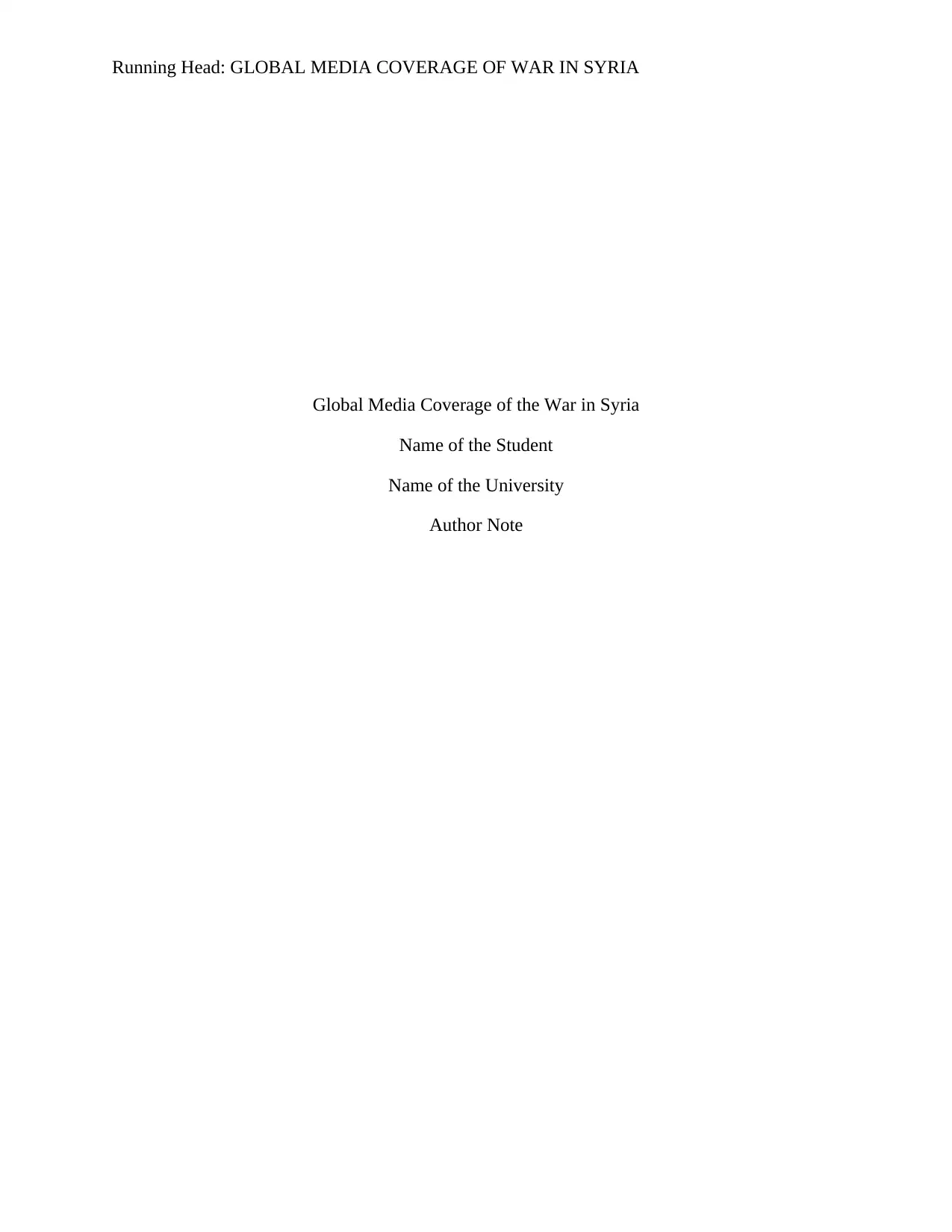
Running Head: GLOBAL MEDIA COVERAGE OF WAR IN SYRIA
Global Media Coverage of the War in Syria
Name of the Student
Name of the University
Author Note
Global Media Coverage of the War in Syria
Name of the Student
Name of the University
Author Note
Paraphrase This Document
Need a fresh take? Get an instant paraphrase of this document with our AI Paraphraser
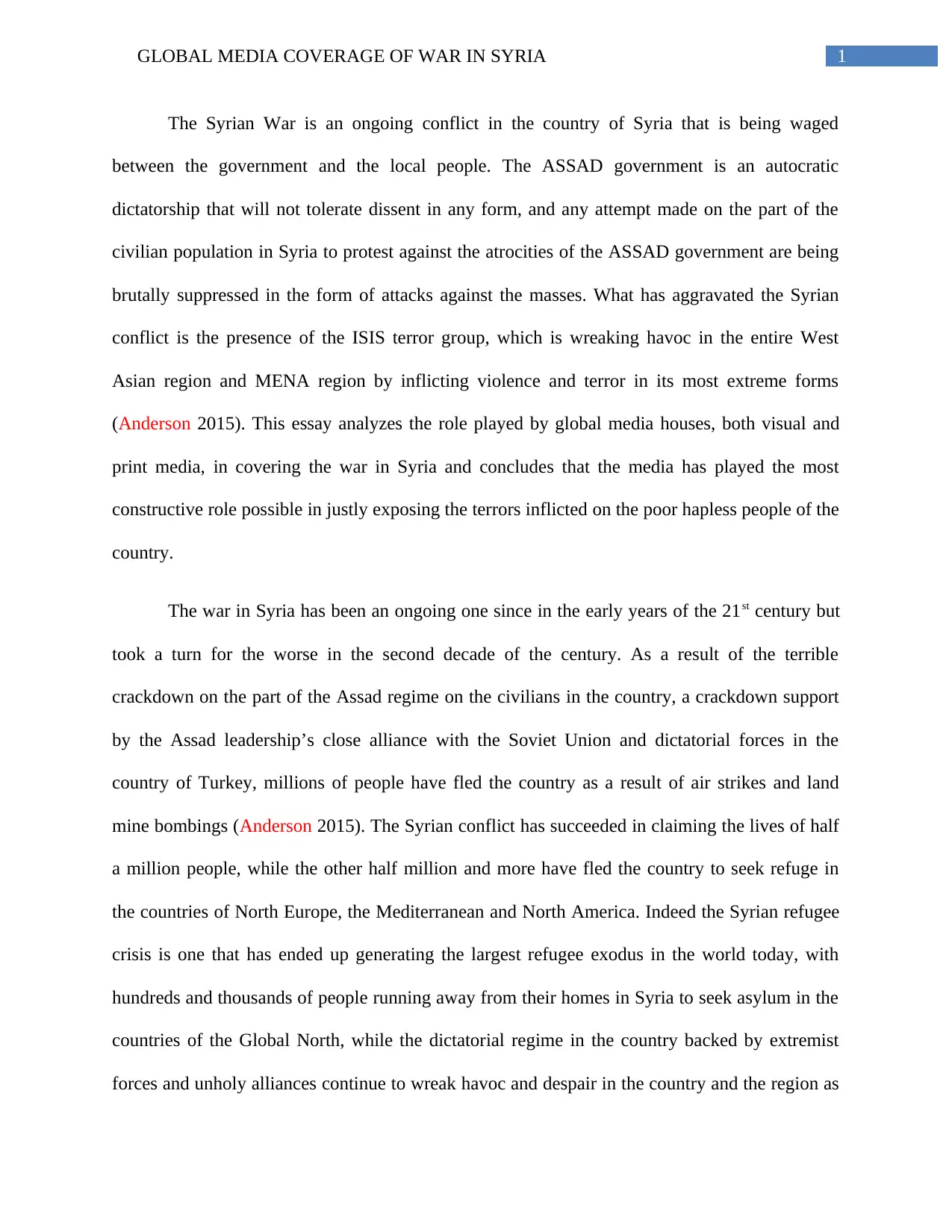
1GLOBAL MEDIA COVERAGE OF WAR IN SYRIA
The Syrian War is an ongoing conflict in the country of Syria that is being waged
between the government and the local people. The ASSAD government is an autocratic
dictatorship that will not tolerate dissent in any form, and any attempt made on the part of the
civilian population in Syria to protest against the atrocities of the ASSAD government are being
brutally suppressed in the form of attacks against the masses. What has aggravated the Syrian
conflict is the presence of the ISIS terror group, which is wreaking havoc in the entire West
Asian region and MENA region by inflicting violence and terror in its most extreme forms
(Anderson 2015). This essay analyzes the role played by global media houses, both visual and
print media, in covering the war in Syria and concludes that the media has played the most
constructive role possible in justly exposing the terrors inflicted on the poor hapless people of the
country.
The war in Syria has been an ongoing one since in the early years of the 21st century but
took a turn for the worse in the second decade of the century. As a result of the terrible
crackdown on the part of the Assad regime on the civilians in the country, a crackdown support
by the Assad leadership’s close alliance with the Soviet Union and dictatorial forces in the
country of Turkey, millions of people have fled the country as a result of air strikes and land
mine bombings (Anderson 2015). The Syrian conflict has succeeded in claiming the lives of half
a million people, while the other half million and more have fled the country to seek refuge in
the countries of North Europe, the Mediterranean and North America. Indeed the Syrian refugee
crisis is one that has ended up generating the largest refugee exodus in the world today, with
hundreds and thousands of people running away from their homes in Syria to seek asylum in the
countries of the Global North, while the dictatorial regime in the country backed by extremist
forces and unholy alliances continue to wreak havoc and despair in the country and the region as
The Syrian War is an ongoing conflict in the country of Syria that is being waged
between the government and the local people. The ASSAD government is an autocratic
dictatorship that will not tolerate dissent in any form, and any attempt made on the part of the
civilian population in Syria to protest against the atrocities of the ASSAD government are being
brutally suppressed in the form of attacks against the masses. What has aggravated the Syrian
conflict is the presence of the ISIS terror group, which is wreaking havoc in the entire West
Asian region and MENA region by inflicting violence and terror in its most extreme forms
(Anderson 2015). This essay analyzes the role played by global media houses, both visual and
print media, in covering the war in Syria and concludes that the media has played the most
constructive role possible in justly exposing the terrors inflicted on the poor hapless people of the
country.
The war in Syria has been an ongoing one since in the early years of the 21st century but
took a turn for the worse in the second decade of the century. As a result of the terrible
crackdown on the part of the Assad regime on the civilians in the country, a crackdown support
by the Assad leadership’s close alliance with the Soviet Union and dictatorial forces in the
country of Turkey, millions of people have fled the country as a result of air strikes and land
mine bombings (Anderson 2015). The Syrian conflict has succeeded in claiming the lives of half
a million people, while the other half million and more have fled the country to seek refuge in
the countries of North Europe, the Mediterranean and North America. Indeed the Syrian refugee
crisis is one that has ended up generating the largest refugee exodus in the world today, with
hundreds and thousands of people running away from their homes in Syria to seek asylum in the
countries of the Global North, while the dictatorial regime in the country backed by extremist
forces and unholy alliances continue to wreak havoc and despair in the country and the region as
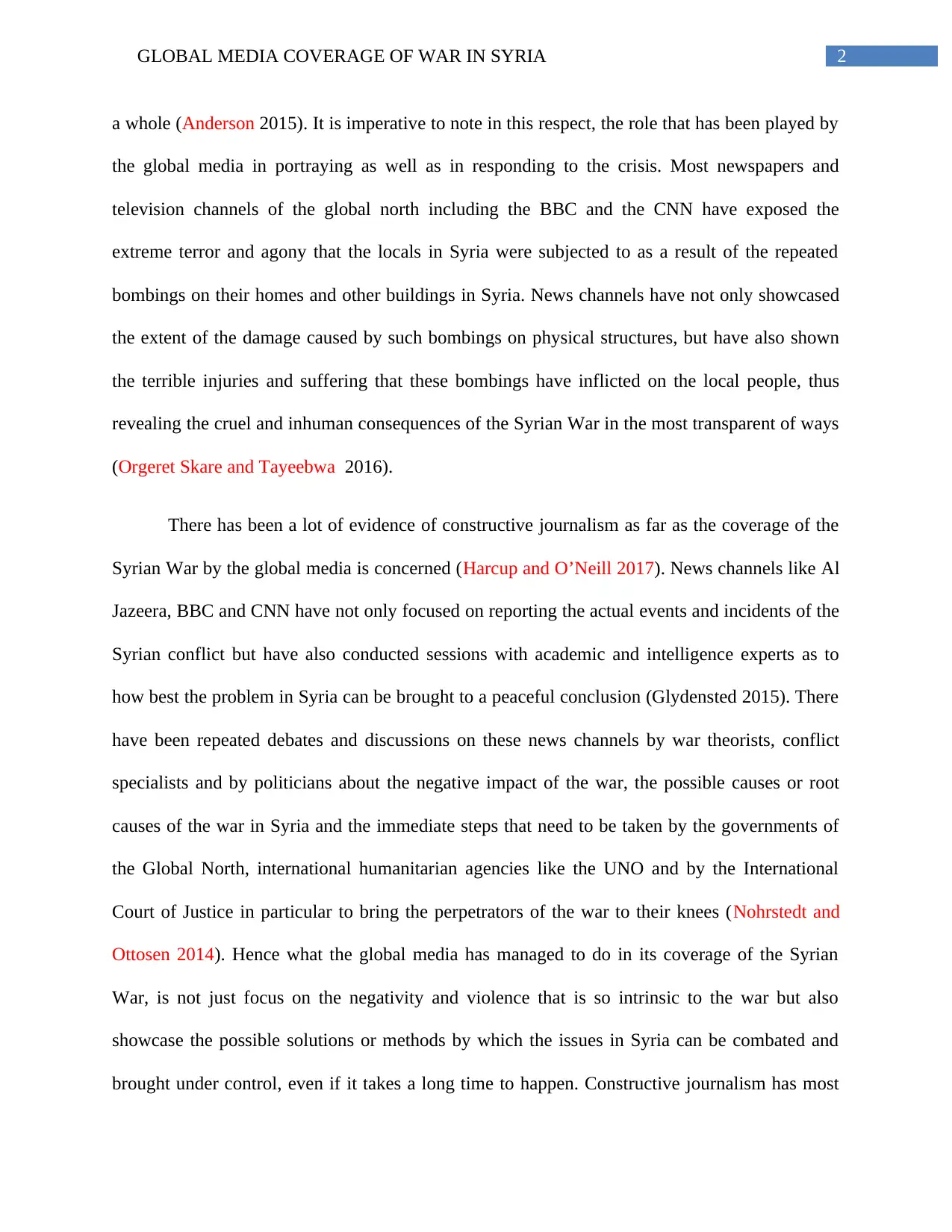
2GLOBAL MEDIA COVERAGE OF WAR IN SYRIA
a whole (Anderson 2015). It is imperative to note in this respect, the role that has been played by
the global media in portraying as well as in responding to the crisis. Most newspapers and
television channels of the global north including the BBC and the CNN have exposed the
extreme terror and agony that the locals in Syria were subjected to as a result of the repeated
bombings on their homes and other buildings in Syria. News channels have not only showcased
the extent of the damage caused by such bombings on physical structures, but have also shown
the terrible injuries and suffering that these bombings have inflicted on the local people, thus
revealing the cruel and inhuman consequences of the Syrian War in the most transparent of ways
(Orgeret Skare and Tayeebwa 2016).
There has been a lot of evidence of constructive journalism as far as the coverage of the
Syrian War by the global media is concerned (Harcup and O’Neill 2017). News channels like Al
Jazeera, BBC and CNN have not only focused on reporting the actual events and incidents of the
Syrian conflict but have also conducted sessions with academic and intelligence experts as to
how best the problem in Syria can be brought to a peaceful conclusion (Glydensted 2015). There
have been repeated debates and discussions on these news channels by war theorists, conflict
specialists and by politicians about the negative impact of the war, the possible causes or root
causes of the war in Syria and the immediate steps that need to be taken by the governments of
the Global North, international humanitarian agencies like the UNO and by the International
Court of Justice in particular to bring the perpetrators of the war to their knees (Nohrstedt and
Ottosen 2014). Hence what the global media has managed to do in its coverage of the Syrian
War, is not just focus on the negativity and violence that is so intrinsic to the war but also
showcase the possible solutions or methods by which the issues in Syria can be combated and
brought under control, even if it takes a long time to happen. Constructive journalism has most
a whole (Anderson 2015). It is imperative to note in this respect, the role that has been played by
the global media in portraying as well as in responding to the crisis. Most newspapers and
television channels of the global north including the BBC and the CNN have exposed the
extreme terror and agony that the locals in Syria were subjected to as a result of the repeated
bombings on their homes and other buildings in Syria. News channels have not only showcased
the extent of the damage caused by such bombings on physical structures, but have also shown
the terrible injuries and suffering that these bombings have inflicted on the local people, thus
revealing the cruel and inhuman consequences of the Syrian War in the most transparent of ways
(Orgeret Skare and Tayeebwa 2016).
There has been a lot of evidence of constructive journalism as far as the coverage of the
Syrian War by the global media is concerned (Harcup and O’Neill 2017). News channels like Al
Jazeera, BBC and CNN have not only focused on reporting the actual events and incidents of the
Syrian conflict but have also conducted sessions with academic and intelligence experts as to
how best the problem in Syria can be brought to a peaceful conclusion (Glydensted 2015). There
have been repeated debates and discussions on these news channels by war theorists, conflict
specialists and by politicians about the negative impact of the war, the possible causes or root
causes of the war in Syria and the immediate steps that need to be taken by the governments of
the Global North, international humanitarian agencies like the UNO and by the International
Court of Justice in particular to bring the perpetrators of the war to their knees (Nohrstedt and
Ottosen 2014). Hence what the global media has managed to do in its coverage of the Syrian
War, is not just focus on the negativity and violence that is so intrinsic to the war but also
showcase the possible solutions or methods by which the issues in Syria can be combated and
brought under control, even if it takes a long time to happen. Constructive journalism has most
⊘ This is a preview!⊘
Do you want full access?
Subscribe today to unlock all pages.

Trusted by 1+ million students worldwide
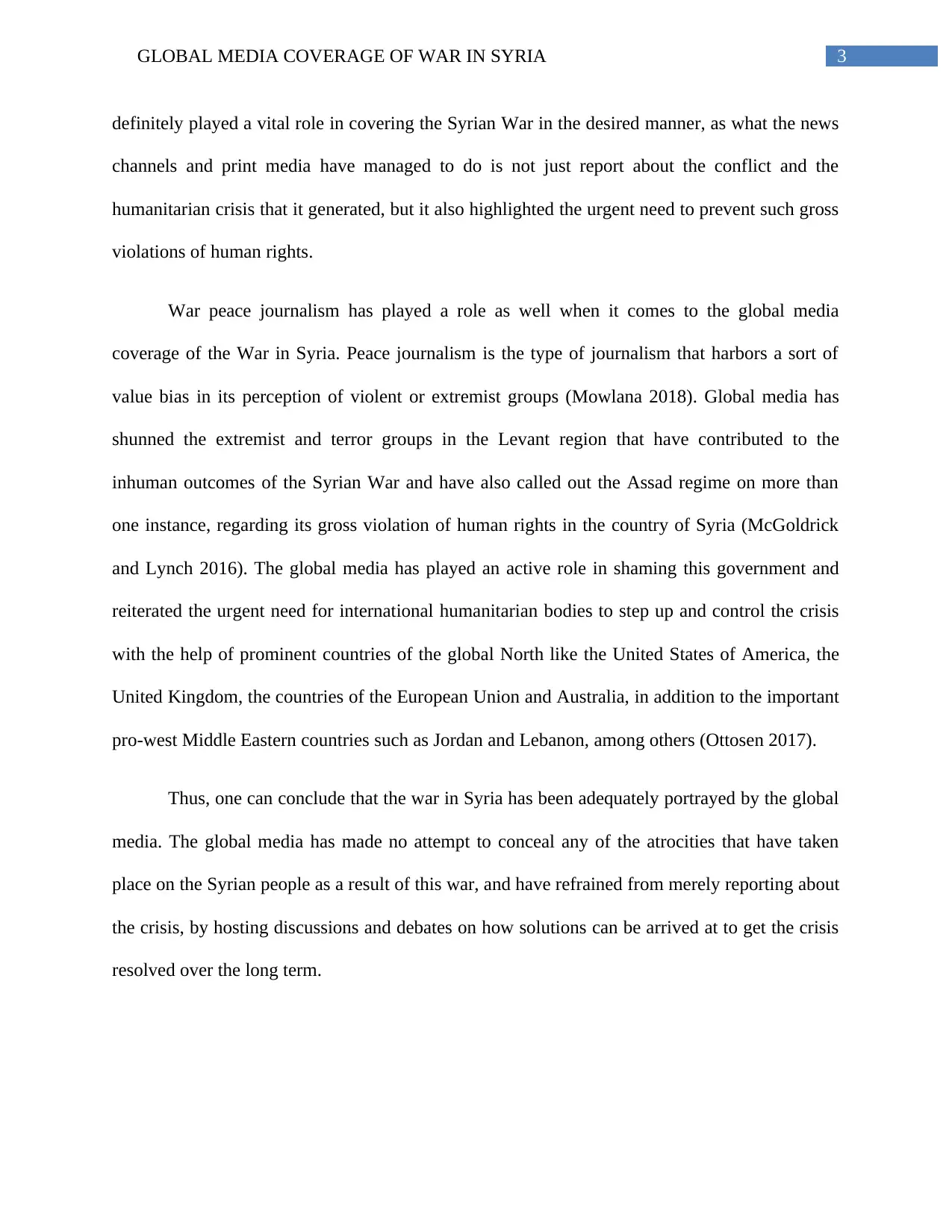
3GLOBAL MEDIA COVERAGE OF WAR IN SYRIA
definitely played a vital role in covering the Syrian War in the desired manner, as what the news
channels and print media have managed to do is not just report about the conflict and the
humanitarian crisis that it generated, but it also highlighted the urgent need to prevent such gross
violations of human rights.
War peace journalism has played a role as well when it comes to the global media
coverage of the War in Syria. Peace journalism is the type of journalism that harbors a sort of
value bias in its perception of violent or extremist groups (Mowlana 2018). Global media has
shunned the extremist and terror groups in the Levant region that have contributed to the
inhuman outcomes of the Syrian War and have also called out the Assad regime on more than
one instance, regarding its gross violation of human rights in the country of Syria (McGoldrick
and Lynch 2016). The global media has played an active role in shaming this government and
reiterated the urgent need for international humanitarian bodies to step up and control the crisis
with the help of prominent countries of the global North like the United States of America, the
United Kingdom, the countries of the European Union and Australia, in addition to the important
pro-west Middle Eastern countries such as Jordan and Lebanon, among others (Ottosen 2017).
Thus, one can conclude that the war in Syria has been adequately portrayed by the global
media. The global media has made no attempt to conceal any of the atrocities that have taken
place on the Syrian people as a result of this war, and have refrained from merely reporting about
the crisis, by hosting discussions and debates on how solutions can be arrived at to get the crisis
resolved over the long term.
definitely played a vital role in covering the Syrian War in the desired manner, as what the news
channels and print media have managed to do is not just report about the conflict and the
humanitarian crisis that it generated, but it also highlighted the urgent need to prevent such gross
violations of human rights.
War peace journalism has played a role as well when it comes to the global media
coverage of the War in Syria. Peace journalism is the type of journalism that harbors a sort of
value bias in its perception of violent or extremist groups (Mowlana 2018). Global media has
shunned the extremist and terror groups in the Levant region that have contributed to the
inhuman outcomes of the Syrian War and have also called out the Assad regime on more than
one instance, regarding its gross violation of human rights in the country of Syria (McGoldrick
and Lynch 2016). The global media has played an active role in shaming this government and
reiterated the urgent need for international humanitarian bodies to step up and control the crisis
with the help of prominent countries of the global North like the United States of America, the
United Kingdom, the countries of the European Union and Australia, in addition to the important
pro-west Middle Eastern countries such as Jordan and Lebanon, among others (Ottosen 2017).
Thus, one can conclude that the war in Syria has been adequately portrayed by the global
media. The global media has made no attempt to conceal any of the atrocities that have taken
place on the Syrian people as a result of this war, and have refrained from merely reporting about
the crisis, by hosting discussions and debates on how solutions can be arrived at to get the crisis
resolved over the long term.
Paraphrase This Document
Need a fresh take? Get an instant paraphrase of this document with our AI Paraphraser
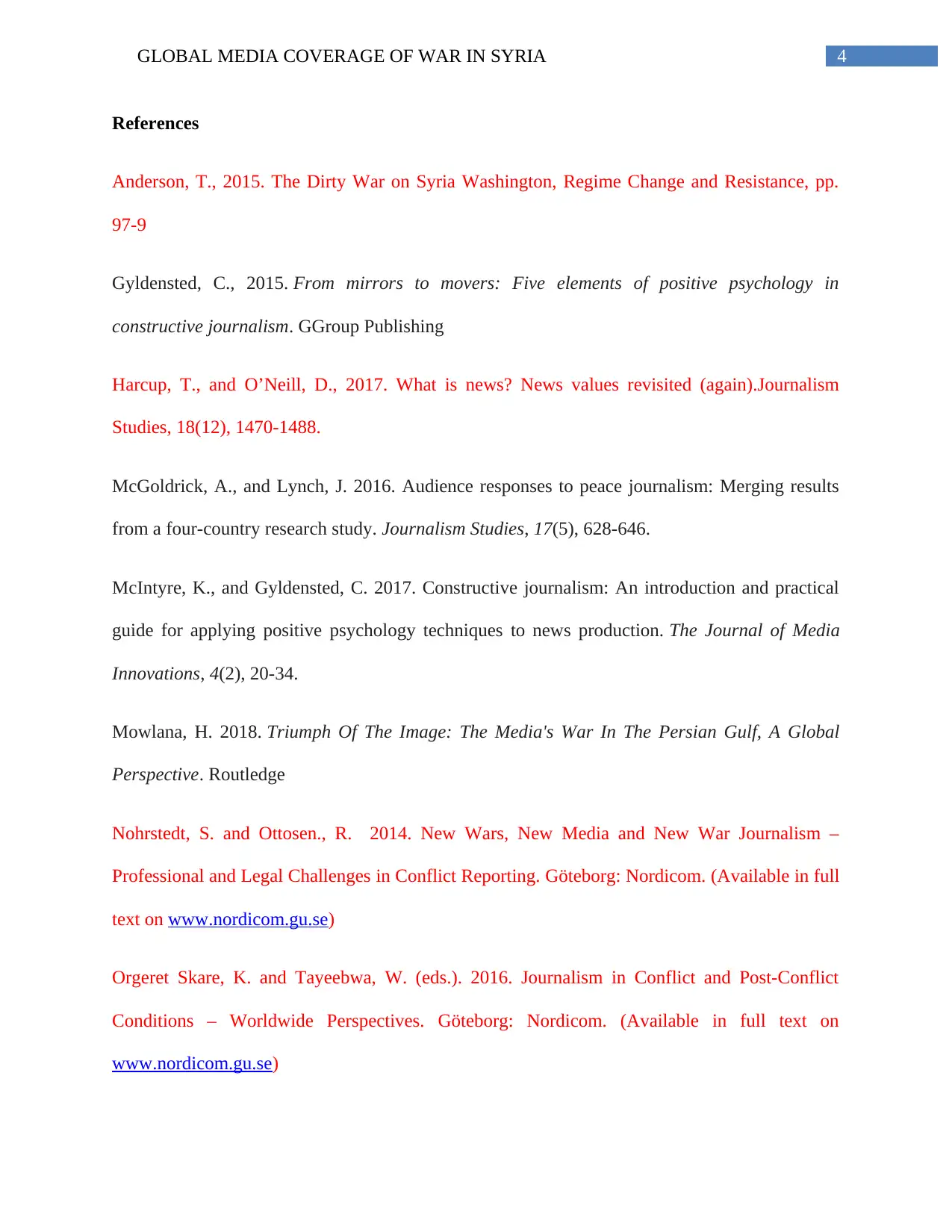
4GLOBAL MEDIA COVERAGE OF WAR IN SYRIA
References
Anderson, T., 2015. The Dirty War on Syria Washington, Regime Change and Resistance, pp.
97-9
Gyldensted, C., 2015. From mirrors to movers: Five elements of positive psychology in
constructive journalism. GGroup Publishing
Harcup, T., and O’Neill, D., 2017. What is news? News values revisited (again).Journalism
Studies, 18(12), 1470-1488.
McGoldrick, A., and Lynch, J. 2016. Audience responses to peace journalism: Merging results
from a four-country research study. Journalism Studies, 17(5), 628-646.
McIntyre, K., and Gyldensted, C. 2017. Constructive journalism: An introduction and practical
guide for applying positive psychology techniques to news production. The Journal of Media
Innovations, 4(2), 20-34.
Mowlana, H. 2018. Triumph Of The Image: The Media's War In The Persian Gulf, A Global
Perspective. Routledge
Nohrstedt, S. and Ottosen., R. 2014. New Wars, New Media and New War Journalism –
Professional and Legal Challenges in Conflict Reporting. Göteborg: Nordicom. (Available in full
text on www.nordicom.gu.se)
Orgeret Skare, K. and Tayeebwa, W. (eds.). 2016. Journalism in Conflict and Post-Conflict
Conditions – Worldwide Perspectives. Göteborg: Nordicom. (Available in full text on
www.nordicom.gu.se)
References
Anderson, T., 2015. The Dirty War on Syria Washington, Regime Change and Resistance, pp.
97-9
Gyldensted, C., 2015. From mirrors to movers: Five elements of positive psychology in
constructive journalism. GGroup Publishing
Harcup, T., and O’Neill, D., 2017. What is news? News values revisited (again).Journalism
Studies, 18(12), 1470-1488.
McGoldrick, A., and Lynch, J. 2016. Audience responses to peace journalism: Merging results
from a four-country research study. Journalism Studies, 17(5), 628-646.
McIntyre, K., and Gyldensted, C. 2017. Constructive journalism: An introduction and practical
guide for applying positive psychology techniques to news production. The Journal of Media
Innovations, 4(2), 20-34.
Mowlana, H. 2018. Triumph Of The Image: The Media's War In The Persian Gulf, A Global
Perspective. Routledge
Nohrstedt, S. and Ottosen., R. 2014. New Wars, New Media and New War Journalism –
Professional and Legal Challenges in Conflict Reporting. Göteborg: Nordicom. (Available in full
text on www.nordicom.gu.se)
Orgeret Skare, K. and Tayeebwa, W. (eds.). 2016. Journalism in Conflict and Post-Conflict
Conditions – Worldwide Perspectives. Göteborg: Nordicom. (Available in full text on
www.nordicom.gu.se)
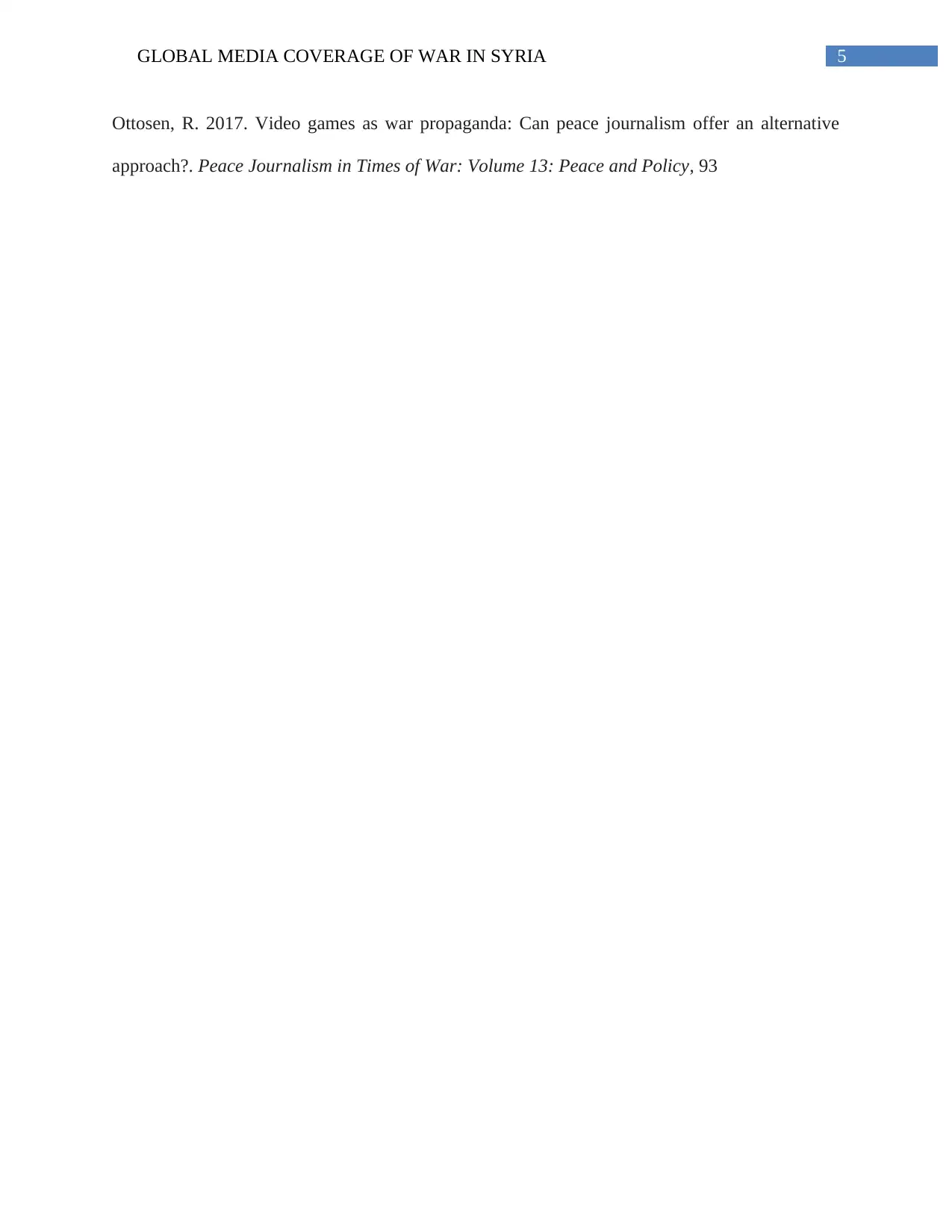
5GLOBAL MEDIA COVERAGE OF WAR IN SYRIA
Ottosen, R. 2017. Video games as war propaganda: Can peace journalism offer an alternative
approach?. Peace Journalism in Times of War: Volume 13: Peace and Policy, 93
Ottosen, R. 2017. Video games as war propaganda: Can peace journalism offer an alternative
approach?. Peace Journalism in Times of War: Volume 13: Peace and Policy, 93
⊘ This is a preview!⊘
Do you want full access?
Subscribe today to unlock all pages.

Trusted by 1+ million students worldwide
1 out of 6
Your All-in-One AI-Powered Toolkit for Academic Success.
+13062052269
info@desklib.com
Available 24*7 on WhatsApp / Email
![[object Object]](/_next/static/media/star-bottom.7253800d.svg)
Unlock your academic potential
Copyright © 2020–2026 A2Z Services. All Rights Reserved. Developed and managed by ZUCOL.

